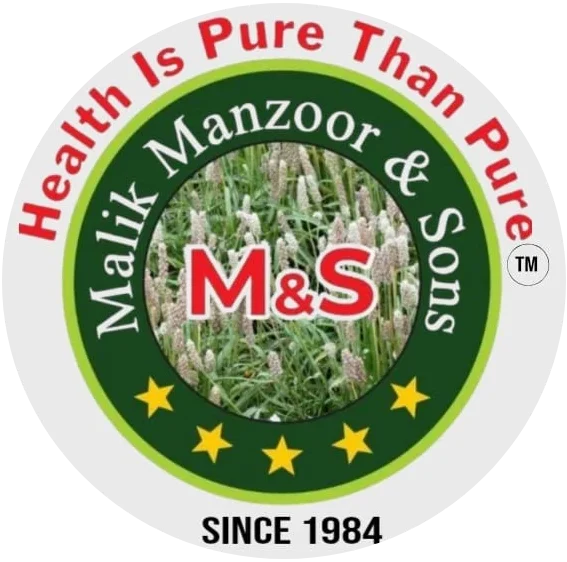Is Psyllium Husk Powder Gluten Free? Your Complete Expert Guide
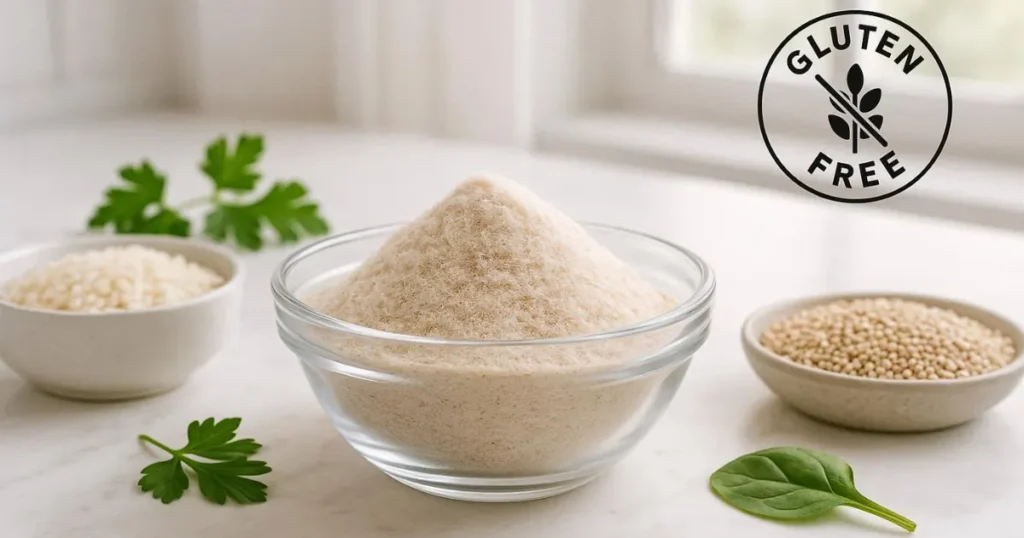
If you’re managing celiac disease, gluten sensitivity, or simply following a gluten-free lifestyle, I know how crucial it is to scrutinize every ingredient that enters your kitchen. As someone who’s been growing, processing, and supplying psyllium globally for years, I’ve fielded countless question, is psyllium husk powder Gluten Free. Let me share what I’ve learned through decades of hands-on experience in the fields of Pakistan and India, where the world’s finest psyllium is cultivated.
The short answer? Yes, psyllium husk powder is naturally gluten free. But there’s more to this story than a simple yes or no – and understanding the nuances can make all the difference in your health journey.
Understanding Psyllium Husk Powder: What It Really Is?
Before we dive into the question: Is psyllium husk powder Gluten Free? let me explain what psyllium husk powder actually is. I’ve watched these plants grow from tiny seeds into the remarkable fiber source that’s helped millions manage their digestive health.
Psyllium comes from the Plantago ovata plant, a small herb that thrives in the arid regions of Pakistan and India. The plant produces small seeds, and surrounding these seeds is a thin coating called the husk. This husk is where all the magic happens – it contains approximately 70% soluble fiber, primarily composed of a compound called arabinoxylans.
When we process psyllium at our facilities, we carefully separate these husks from the seeds, then mill them into a fine powder. This powder is pure plant fiber – no wheat, no barley, no rye, and certainly no gluten proteins.
The Science Behind Psyllium’s Gluten-Free Nature
Here’s what makes psyllium husk powder naturally free from gluten: it comes from an entirely different botanical family than gluten-containing grains. Wheat, barley, and rye belong to the Poaceae (grass) family, while psyllium belongs to the Plantaginaceae family. These plants are as unrelated as apples and oranges.
Gluten is a specific protein composite found only in certain cereal grains. The two main proteins that form gluten are gliadin and glutenin. Since psyllium is not a grain and contains no gliadin or glutenin, it’s inherently gluten free at its botanical source.
I’ve had our psyllium husk powder tested by independent laboratories multiple times, and the results consistently show gluten levels far below the WHO, EU and, FDA’s threshold of 20 parts per million (ppm) for gluten-free certification. In fact, when psyllium is processed in dedicated facilities, testing often shows no detectable gluten at all.
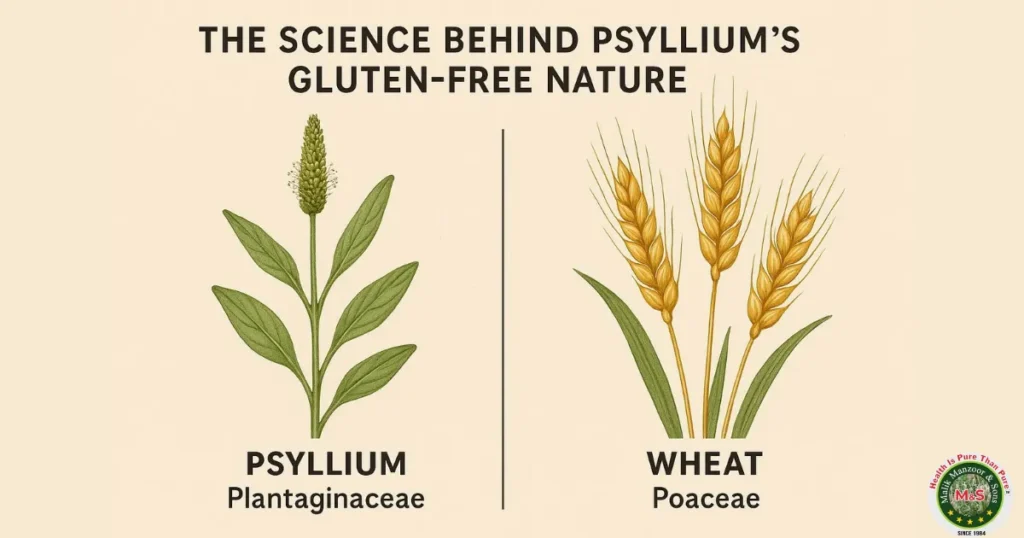
Why Some People Worry About Is Psyllium Husk Powder Gluten Free?
You might wonder why this question even comes up. I’ve noticed three main reasons people express concern:
Cross-contamination during processing:
This is the legitimate concern. While psyllium itself contains no gluten, some manufacturers process multiple products in the same facilities. If a facility also handles wheat-based fiber supplements or uses shared equipment, cross-contamination becomes possible.
Confusion with other fibers:
Some people confuse psyllium with wheat bran or oat fiber, which may contain gluten or be processed alongside gluten-containing grains.
Added ingredients:
Certain psyllium products include flavorings, sweeteners, or other additives that might contain gluten. I always recommend checking the full ingredient list, not just assuming the psyllium component is the only thing in the package.
How to Ensure Your Psyllium Is Truly Gluten Free
Through my years in this industry, I’ve developed a clear checklist for anyone who needs guaranteed gluten-free psyllium:
Look for third-party certification:
Reputable brands will have their products tested and certified by organizations like the Gluten-Free Certification Organization (GFCO) or similar bodies. This certification means the product contains less than 10 ppm of gluten – even stricter than WHO, EU and FDA requirements.
Check the facility practices:
Contact the manufacturer and ask whether they process their psyllium in dedicated gluten-free facilities. At Malik Psyllium, we maintain strict protocols to prevent any cross-contamination, which is why healthcare providers confidently recommend our products to celiac patients.
Read labels carefully:
Scan the ingredient list for any additives, and look for a “gluten-free” label on the packaging. In the United States, this label is regulated by the FDA and can’t be used lightly.
Consider the source: Pure, unflavored psyllium husk powder from a dedicated manufacturer is your safest bet. Avoid products with long ingredient lists or those that combine psyllium with other fiber sources.
Real-World Benefits of Gluten-Free Diets
I’ve seen firsthand how psyllium husk powder becomes a game-changer for people following gluten-free diets. Let me share some insights from the thousands of customers I’ve worked with over the years.
Improving Digestive Health Without Gluten
Many people who eliminate gluten initially struggle with constipation because they’re cutting out whole grain products that provided fiber. Psyllium fills this gap beautifully. One tablespoon provides approximately 5 grams of dietary fiber – about 20% of your daily requirement – without any gluten exposure.
I remember working with a nutritionist who specialized in celiac disease management. She told me that psyllium husk powder became her go-to recommendation because it offered the fiber benefits of whole grains without triggering any immune response in her celiac patients.
Supporting Gluten-Free Baking
Here’s something that surprises many people: psyllium husk powder has become incredibly popular in gluten-free baking. When you remove gluten from recipes, you lose the structure and elasticity that make bread rise and hold together. Psyllium acts as a binder, mimicking some of gluten’s functional properties without containing any gluten proteins.
I’ve experimented with countless gluten-free bread recipes in my own kitchen, and the difference psyllium makes is remarkable. It creates a texture that’s closer to traditional wheat bread than most other gluten-free alternatives.
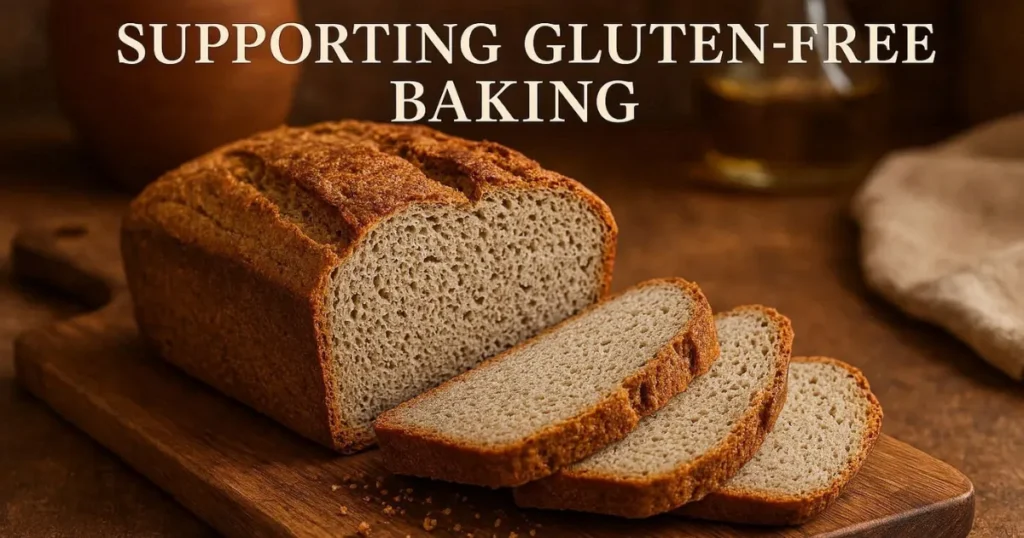
Managing Blood Sug-ar on Restricted Diets
For those managing both celiac disease and diabetes – a combination that’s more common than you might think – psyllium offers dual benefits. The soluble fiber slows glucose absorption, helping stabilize blood sugar levels. This is particularly valuable when gluten-free packaged foods often contain more simple carbohydrates than their gluten-containing counterparts.
Psyllium vs. Other Fiber Supplements: The Gluten Factor
Is psyllium husk powder Gluten Free? Let me break down how psyllium compares to other popular fiber supplements when it comes to gluten content:
Wheat bran:
Contains gluten and should be avoided completely by those with celiac disease or gluten sensitivity.
Oat fiber:
While oats don’t naturally contain gluten, they’re often cross-contaminated during growing and processing. Only certified gluten-free oats are safe for celiac patients.
Inulin:
Naturally gluten free and derived from chicory root or Jerusalem artichokes. However, it functions differently from psyllium and may cause more gas and bloating.
Methylcellulose:
Synthetic, gluten free, but lacks the additional health benefits of natural psyllium.
Acacia fiber:
Naturally gluten free and well-tolerated, though it provides less fiber per serving than psyllium.
In my experience, pure psyllium husk powder offers the best combination of effectiveness, tolerability, and guaranteed gluten-free status when sourced from reputable manufacturers.
Common Myths About Psyllium and Gluten
Is psyllium husk powder Gluten Free? Over the years, I’ve heard some persistent misconceptions that I want to address directly:
Myth 1:
“All fiber supplements contain some gluten.”
Reality:
Many fiber sources, including psyllium, flaxseed, and chia seeds, are naturally and completely gluten free.
Myth 2:
“The ‘husk’ means it comes from wheat husks.”
Reality:
The term “husk” refers to the outer coating of the psyllium seed. It has nothing to do with wheat or any gluten-containing grain.
Myth 3:
“You need gluten for fiber supplements to work.”
Reality:
Fiber’s beneficial effects on digestion, cholesterol, and blood sugar have nothing to do with gluten. Gluten-free fibers like psyllium work just as effectively – if not more so.
How to Incorporate Gluten-Free Psyllium Into Your Routine
After working with thousands of people transitioning to gluten-free diets, I’ve developed some practical recommendations:
Start slowly:
Begin with half a teaspoon daily and gradually increase to one or two tablespoons. This gives your digestive system time to adjust, regardless of whether gluten is involved.
Hydrate properly:
Mix psyllium with at least 8 ounces of water and drink another glass afterward. Adequate hydration is crucial for psyllium to work effectively and comfortably.
Timing matters:
I recommend taking psyllium at least two hours before or after medications, as it can affect absorption. This advice applies to everyone, not just those avoiding gluten.
Mix it right:
Add psyllium to smoothies, yogurt, or gluten-free oatmeal. Stir it immediately and drink quickly before it thickens – a trick I learned from years of daily use.
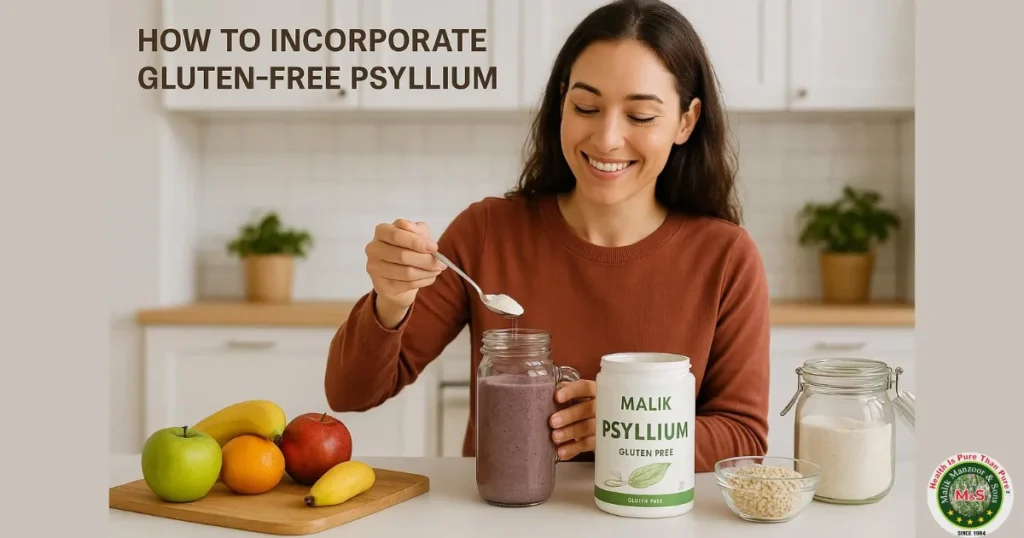
The Quality Difference: What to Look For
Not all psyllium husk powder is created equal, and quality matters significantly when you’re managing gluten sensitivity or celiac disease.
Purity level:
Look for products that are 99% pure psyllium husk powder with no fillers or additives. Lower-quality products might bulk up their formulas with cheaper ingredients that could contain gluten.
Color and texture:
High-quality psyllium husk powder should be light beige to nearly white in color and have a fine, consistent texture. The finer the grind, the easier it mixes and the more pleasant the experience.
Processing standards:
Ask whether the manufacturer follows Good Manufacturing Practices (GMP) and has their facility regularly inspected. These standards help ensure that what’s on the label matches what’s in the package.
Testing frequency:
Reputable manufacturers test each batch for contaminants, including gluten, heavy metals, and microbial content. At Malik Psyllium, we’ve made batch testing a non-negotiable part of our quality control.
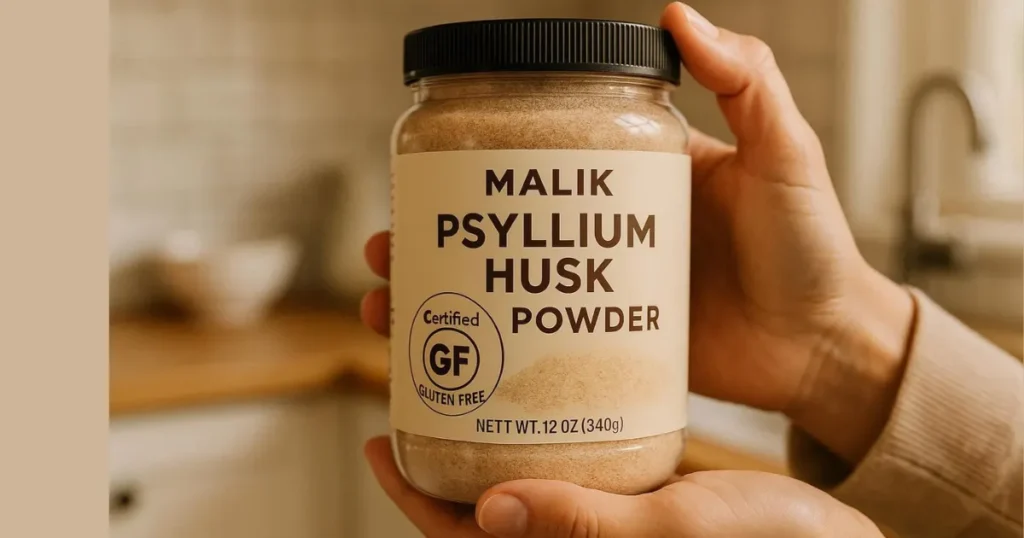
Special Considerations for Celiac Patients: Is psyllium husk powder gluten free?
If you have been diagnosed with celiac disease, you’re likely even more cautious than those with general gluten sensitivity. Based on my consultations with gastroenterologists and celiac specialists, here’s what you should know:
Even trace amounts of gluten (as little as 20 ppm) can trigger an immune response in celiac patients. This is why choosing certified gluten-free psyllium is essential, not just preferable. The certification process involves regular testing and facility inspections that go beyond simple labeling.
Some celiac patients initially experience digestive changes when adding psyllium, which they might mistake for a gluten reaction. In reality, it’s usually just their system adjusting to increased fiber intake. However, if you experience symptoms that feel like gluten exposure – fatigue, brain fog, digestive distress – discontinue use and consult your healthcare provider.
I’ve also noticed that people with newly diagnosed celiac disease often have compromised gut health that makes them temporarily more sensitive to dietary changes. In these cases, starting with very small amounts of psyllium and increasing gradually works better than jumping to full doses.
Reading Labels: A Practical Guide
Let me walk you through what I look for when evaluating a psyllium product for gluten-free compliance:
Ingredient section:
Should list only “Psyllium Husk Powder” or “Plantago Ovata Husk Powder.” Any additional ingredients require scrutiny.
Allergen statement:
Look for “Gluten-Free” prominently displayed. Many manufacturers also include a statement like “Processed in a gluten-free facility” or “No gluten-containing ingredients.”
Certifications:
Check for logos from GFCO, NSF International, or other recognized certification bodies. These aren’t just marketing – they represent rigorous testing.
Country of origin:
While this doesn’t directly relate to gluten content, knowing where your psyllium comes from helps you assess quality. Pakistan and some parts of India produces the world’s finest psyllium, particularly from the regions where we grow ours.
The Science of Safe Processing: Is psyllium husk powder gluten free?
I want to take you behind the scenes of how we ensure our psyllium remains gluten free throughout processing. This transparency matters because contamination typically happens during manufacturing, not in the field.
Our facilities process only psyllium and psyllium-related products – no wheat, barley, or rye ever enters our processing areas. We use dedicated equipment that’s never shared with gluten-containing products. Between batches, we follow strict cleaning protocols that would satisfy the most cautious celiac patient.
The air handling systems in our processing facilities are designed to prevent cross-contamination from outside sources. We test not just the final product but also environmental samples from our facility surfaces to ensure gluten never infiltrates our production areas.
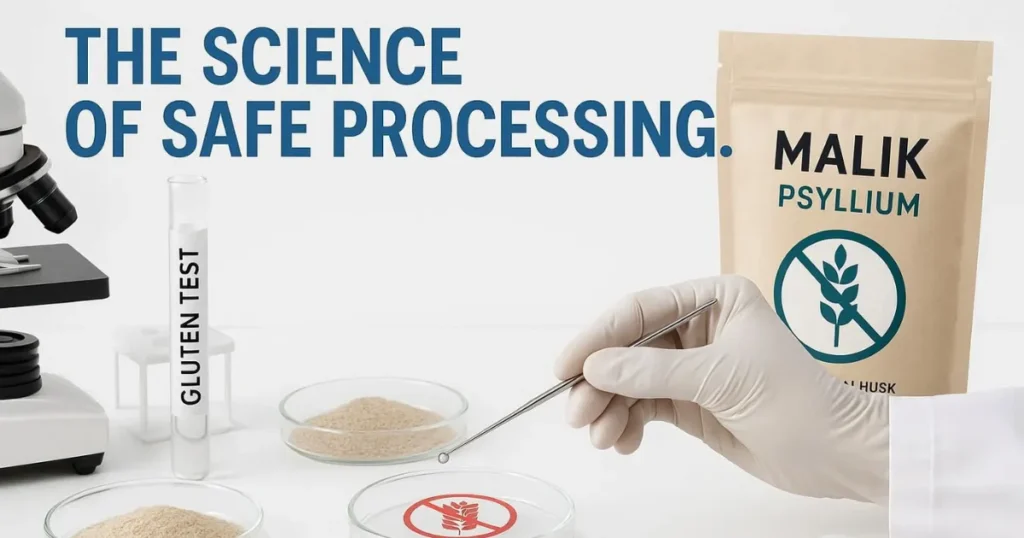
Expert Perspective: Why This Matters for Your Health
From my vantage point as both a grower and someone who’s studied digestive health extensively, I can tell you that the gluten-free status of psyllium husk powder is about more than just avoiding symptoms – it’s about enabling healing.
For celiac patients, the small intestine needs time to repair the damage caused by gluten exposure. During this healing period, adequate fiber intake is crucial for maintaining regular bowel movements and supporting the gut microbiome. Psyllium provides this support without risking further damage.
Beyond celiac disease, many people find they feel better without gluten, even if they don’t have a formal diagnosis. For these individuals, knowing that their fiber supplement is naturally and certifiably gluten free provides peace of mind that supports their overall wellness journey.m
My Personal Recommendation
After decades in this industry, I’ve seen the transformative effect that high-quality, verified gluten-free psyllium husk powder can have on people’s lives. Whether you’re managing celiac disease, experimenting with gluten-free living, or want the digestive and metabolic benefits of soluble fiber, pure psyllium husk powder deserves a place in your wellness routine.
The key is choosing wisely. Don’t just grab the cheapest option off the shelf – invest in a product from a manufacturer who takes gluten-free protocols seriously, tests regularly, and stands behind their quality claims with certifications.
Is psyllium husk powder safe for people with celiac disease?
Yes, pure psyllium husk powder is safe for people with celiac disease when it’s certified gluten free and processed in dedicated facilities. Psyllium comes from a completely different plant family than gluten-containing grains, making it naturally free of gluten proteins. However, always verify that your specific product has been tested and certified.
Does psyllium husk powder contain any wheat or grain products?
No, authentic psyllium husk powder contains no wheat, barley, rye, or any other grain products. It’s derived exclusively from the Plantago ovata plant’s seed husks. The confusion sometimes arises because psyllium is a fiber supplement, and people associate fiber with whole grains, but they’re completely unrelated sources.
Can I use psyllium husk powder in gluten-free baking?
Absolutely! Psyllium husk powder has become one of the most popular ingredients in gluten-free baking because it helps bind ingredients and create a structure that mimics gluten’s role in traditional baking. It’s especially effective in bread recipes, where it improves texture and moisture retention without introducing any gluten.
How do I know if my psyllium is truly gluten free?
Look for products with third-party gluten-free certification from organizations like GFCO, which test for gluten levels below 10 ppm. Check that the product is processed in a dedicated gluten-free facility and read the full ingredient list to ensure no gluten-containing additives. When in doubt, contact the manufacturer directly about their testing protocols.
Are all brands of psyllium husk powder gluten free?
While psyllium itself is naturally gluten free, not all brands process their products in ways that prevent cross-contamination. Some manufacturers use shared facilities or equipment that also handles gluten-containing products. Always choose brands that specifically label their psyllium as gluten free and provide certification or testing documentation.
Can psyllium help with gluten-related digestive issues?
While psyllium won’t treat celiac disease or gluten sensitivity, it can help manage some of the digestive symptoms people experience, such as constipation or irregular bowel movements. It’s supportive, not curative.
Is flavored psyllium still gluten free?
This depends entirely on the flavorings and additives used. Some artificial and natural flavors may be derived from gluten-containing sources or processed on shared equipment. Stick with unflavored or carefully check labels on flavored varieties.
How quickly can I trust a new psyllium brand?
If a product carries a legitimate gluten-free certification, you can trust it immediately. Without certification, I’d recommend contacting the manufacturer directly with specific questions about their testing protocols and facility practices.
Conclusion
Understanding “Is Psyllium Husk Powder Gluten Free” isn’t just about reading a label – it’s about knowing how to evaluate quality, recognize legitimate certifications, and choose products from manufacturers who prioritize purity and safety.
I’ve dedicated my career to producing the highest quality psyllium available, and that commitment includes rigorous gluten-free protocols that protect everyone from casual gluten-avoiders to those with severe celiac disease. When you choose carefully sourced, properly certified psyllium husk powder, you’re not just adding fiber to your diet – you’re investing in a naturally gluten-free superfood that supports digestive health, metabolic function, and overall wellness.
Your digestive health deserves the best, and that starts with pure, verified ingredients you can trust completely. Whether you’re baking gluten-free bread, managing constipation, or supporting your heart health, knowing your psyllium husk powder is genuinely gluten free lets you focus on feeling your best rather than worrying about what you’re putting in your body.
Malik Shabbir
Featured Blogs
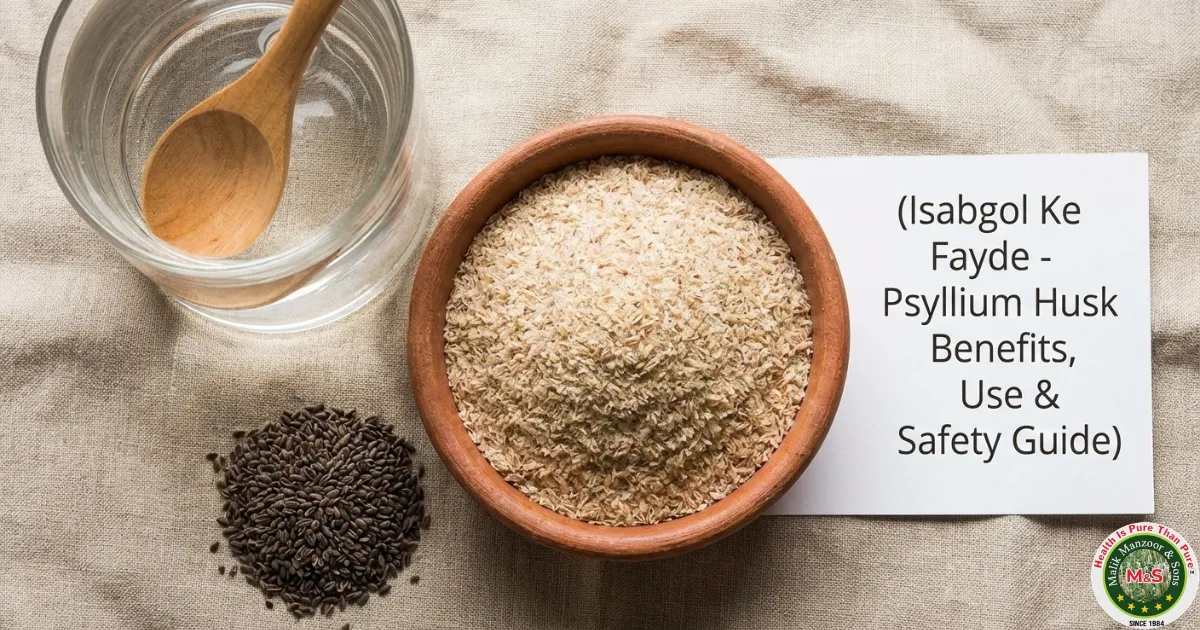
Isabgol Ke Fayde – Psyllium Husk Ke Poori Science-Based Rahnumayi – 2026
Isabgol ke fayde jaanna aaj ke daur mein zyada zaroori
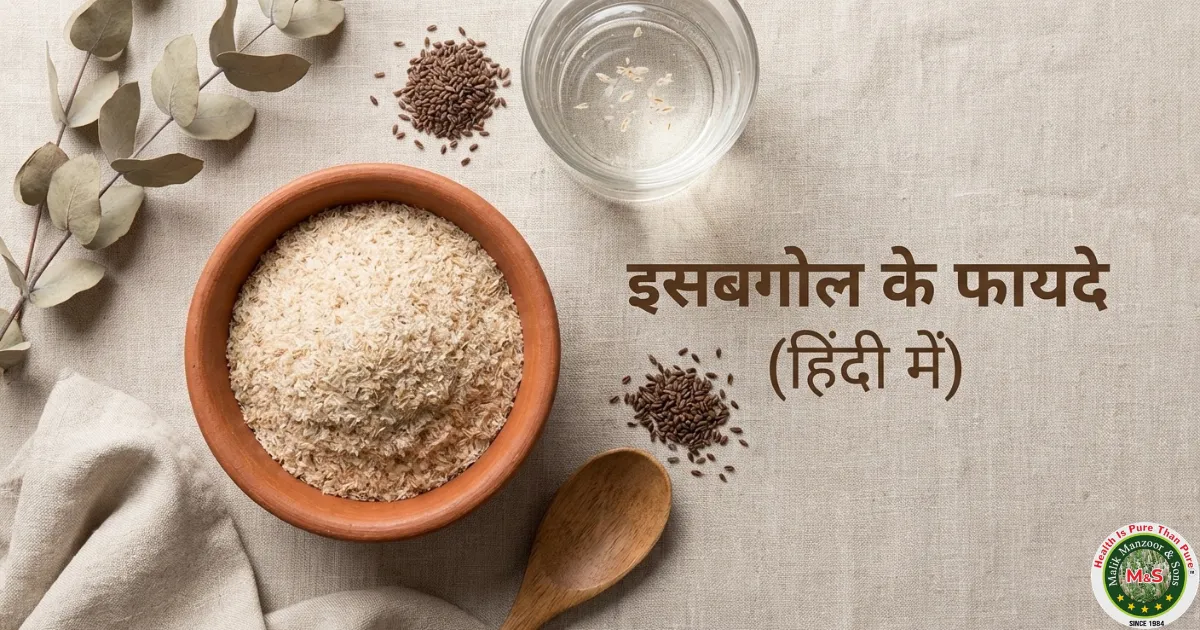
Isabgol Benefits in Hindi | Psyllium Husk Ke Fayde, Sahi Upyog Aur Savdhaniyan – 2026
Agar aap isabgol benefits in hindi mein samajhna chahte hain,
